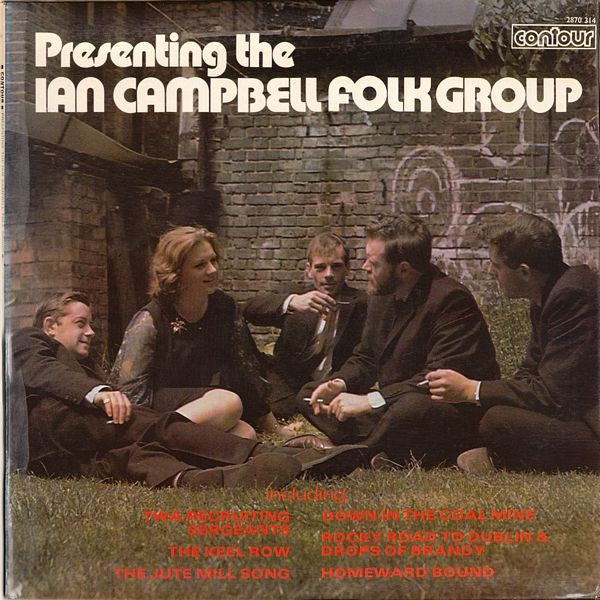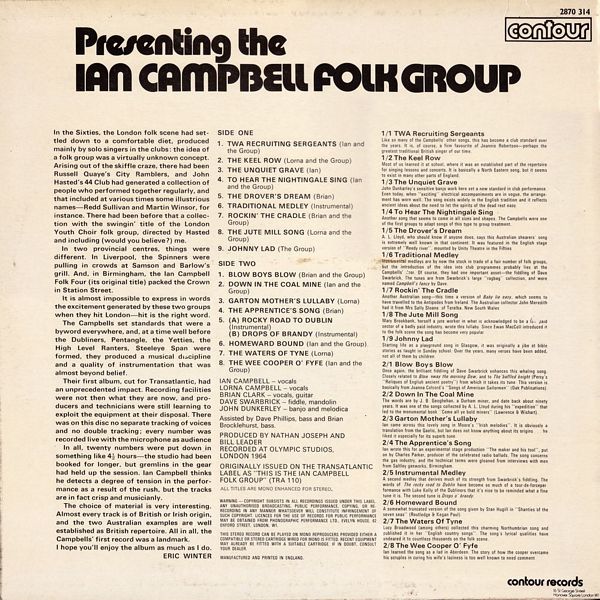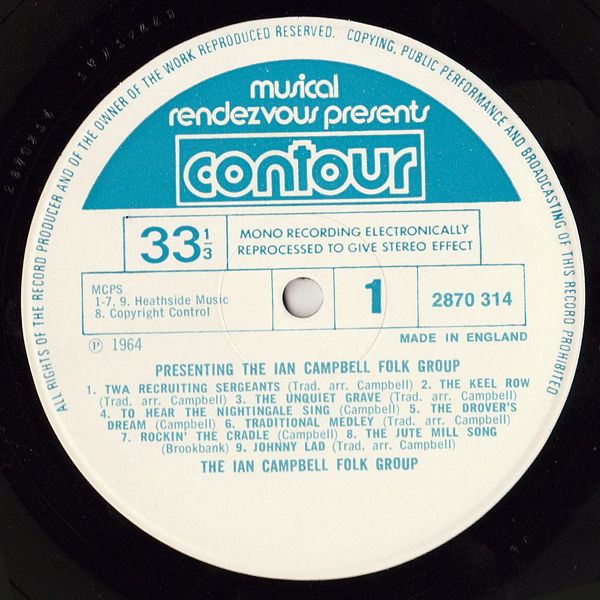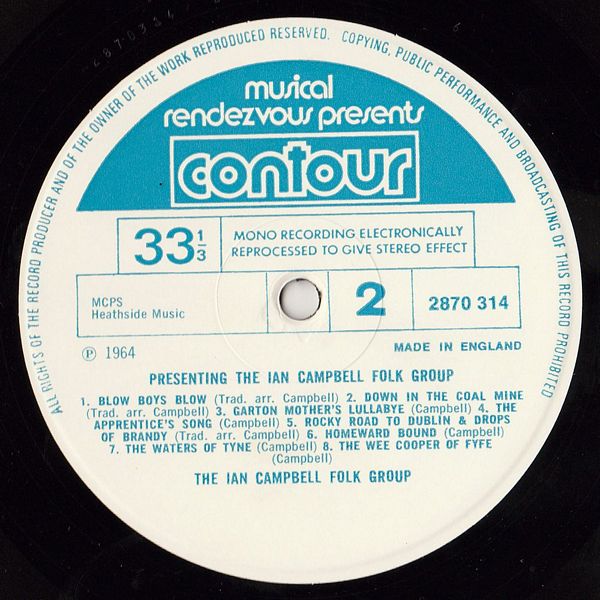

 |


 |
Sleeve Notes
In the Sixties, the London folk scene had settled down to a comfortable diet, produced mainly by solo singers in the clubs: the idea of a folk group was a virtually unknown concept. Arising out of the skiffle craze, there had been Russell Quaye's City Ramblers, and John Hasted s 44 Club had generated a collection of people who performed together regularly, and that included at various times some illustrious names — Redd Sullivan and Martin Winsor, for instance. There had been before that a collection with the swingin' title of the London Youth Choir folk group, directed by Hasted and including (would you believe?) me.
In two provincial centres, things were different. In Liverpool, the Spinners were pulling in crowds at Samson and Barlow's grill. And, in Birmingham, the Ian Campbell Folk Four (its original title) packed the Crown in Station Street.
It is almost impossible to express in words the excitement generated by these two groups when they hit London — hit is the right word.
The Campbells set standards that were a byword everywhere, and, at a time well before the Dubliners, Pentangle, the Yetties, the High Level Ranters, Steeleye Span were formed, they produced a musical discipline and a quality of instrumentation that was almost beyond belief.
Their first album, cut for Transatlantic, had an unprecedented impact. Recording facilities were not then what they are now, and producers and technicians were still learning to exploit the equipment at their disposal. There was on this disc no separate tracking of voices and no double tracking; every number was recorded live with the microphone as audience
In all, twenty numbers were put down in something like 4 1/2 hours — the studio had been booked for longer, but gremlins in the gear had held up the session, Ian Campbell thinks he detects a degree of tension in the performance as a result of the rush, but the tracks are in fact crisp and musicianly.
The choice of material is very interesting. Almost every track is of British or Irish origin, and the two Australian examples are well established as British repertoire. All in all, the Campbells' first record was a landmark. I hope you'll enjoy the album as much as I do.
ERIC WINTER
TWA Recruiting Sergeants
Like so many of the Campbells other songs, this has become a club standard over the years. It is, of course, a firm favourite of Jeannie Robertson perhaps the greatest traditional British singer of our time.
The Keel Row
Most of us learned it at school, where it was an established part of the repertoire for singing lessons and concerts. It is basically a North Eastern song, but it seems to exist in many other parts of England.
The Unquiet Grave
John Dunkerleys sensitive banjo work here set a new standard in club performance Even today, when "exciting' electrical accompaniments are in vogue, the arrangement has worn well. The song exists widely in the English tradition and it reflects ancient ideas about the need to let the spirits of the dead rest easy.
To Hear The Nightingale Sing
Another song that seems to come in all sizes and shapes The Campbells were one of the first groups to adapt songs of this type to group treatment.
The Drover's Dream
A L Lloyd, who should know if anyone does, says this Australian shearers song is extremely well known in that continent It was featured in the English stage version of Reedy river mounted by Unity Theatre in the fifties.
Traditional Medley
Instrumental medleys are by now the stock in trade of a fair number of folk groups, but the introduction of the idea into club programmes probably lies at the Campbells' door. Of course, they had one important asset-the fiddling of Dave Swarbrick the tunes are from Swarbrick s large ragbag collection, and were named Campbell s fancy by Dave.
Rockin' The Cradle
Another Australian song — this time a version of Baby lie easy, which seems to have travelled to the Antipodes from Ireland. The Australian collector John Meredith had it from Mrs Sally Sloane of Teralba New South Wales.
The Jute Mill Song
Mary Brookbank herself a jute worker in what is acknowledged to be a low paid sector of a badly paid industry wrote this lullaby. Since Ewan MacColl introduced it to the folk scene the song has become very popular.
Johnny Lad
Starting life as a playground song in Glasgow, it was originally a jibe at bible stories as taught in Sunday school. Over the years, many verses have been added, not all of them by children.
Blow Boys Blow
Once again the brilliant fiddling of Dave Swarbrick enhances this whaling song. Closely related to Blow away the morning Dew, and to The baffled knight (Percy's Reliques of English ancient poetry) from which it takes its tune. This version is basically from Joanna Colcord's Songs of American Sailormen. (Oak Publications)
Down In The Coal Mine
The words are by J B Geoghehan, a Durham miner, and date back about ninety years. It was one of the songs collected by A L Lloyd during his expedition that led to the monumental book Come all ye bold miners. (Lawrence & Wishart)
Garton Mother's Lullaby
Ian came across this lovely song in Moores Irish melodies. It is obviously a translation from the Gaelic, but Ian does not know anything about its origins. But he liked it especially for its superb tune.
The Apprentice's Song
Ian wrote this for an experimental stage production The maker and his tool, put on by Charles Parker, producer of the celebrated radio ballads. The song concerns the gas industry and the technical terms were gleaned from interviews with men from Saltley gasworks Birmingham.
Instrumental Medley
A second medley that derives much of its strength from Swarbrick's fiddling. The words of The Rocky road to Dublin have become so much of a tour de force performance with Luke Kelly of the Dubliners that it s nice to be reminded what a fine tune it is. The second tune is Drops o brandy.
Homeward Bound
A somewhat truncated version of the song given by Stan Hugill in Shanties of the seven seas. (Routledge & Keqan Paul)
The Waters Of Tyne
Lucy Broadwood (among others) collected this charming Northumbrian song and published it in her English country songs. The songs lyrical qualities have endeared it to countless thousands on the folk scene.
The Wee Cooper O' Fyfe
Ian learned the song as a lad in Aberdeen. The story of how the cooper overcame his scruples in curing his wife s laziness is too well known to need comment.